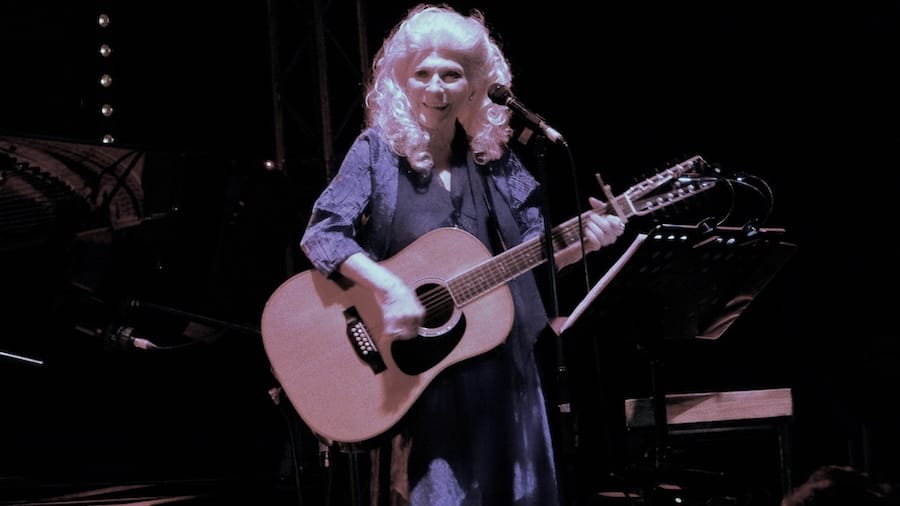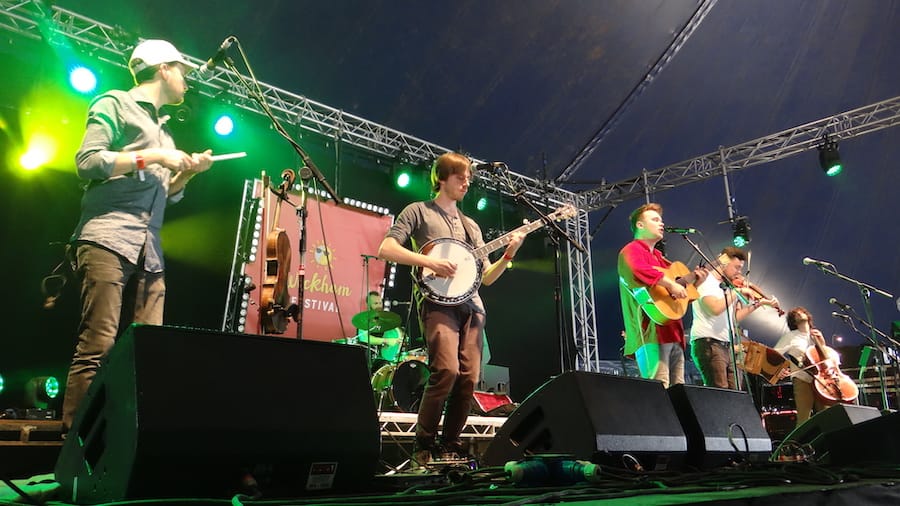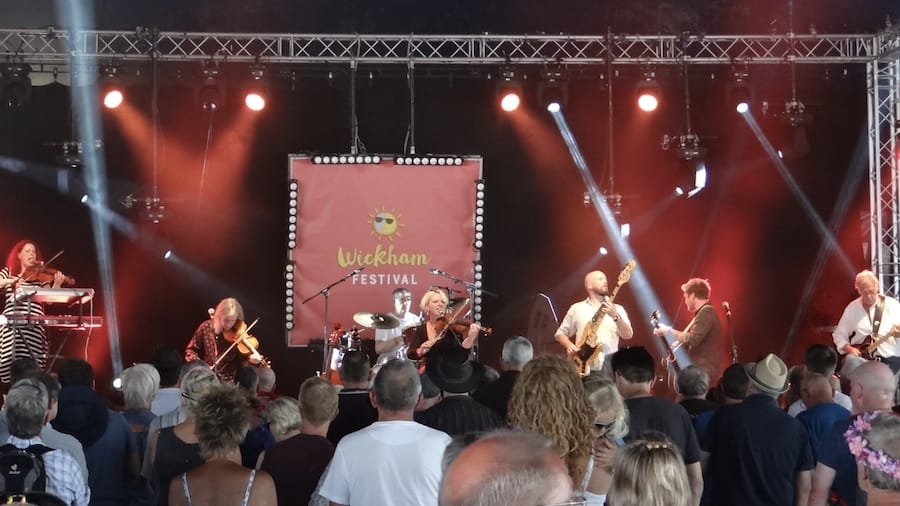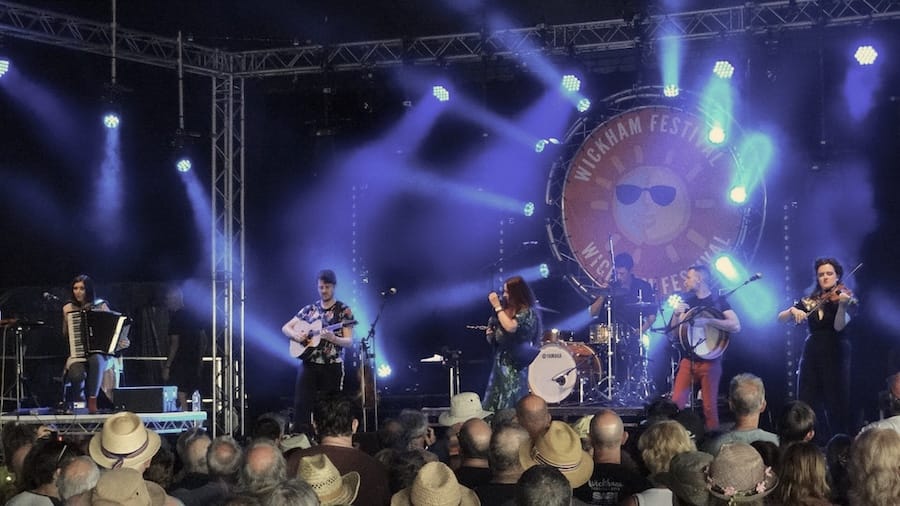Each year, arriving at Wickham, I see evidence of tweaks they’ve made to improve the event. This year, some changes were quite significant, a reconfiguration of the camping arrangements and a substantial investment in the setup of the second main stage. Its big top was made bigger whose sound and lighting systems more closely paralleled those of Main Stage 1 so that acts could be more evenly shared across the two stages. Over the weekend this investment was rewarded with an increase in audience numbers, and with a more even split of the audience between the stages. Mind you, having two more or less equivalent stages isn’t always such a good thing for a one-man festival review team. So, this is likely to be more of a personal highlights piece, though, in fairness, there was only one serious clash. I wasn’t going to miss either Le Vent du Nord or Breabach, it just had to be half of each.
Highlights there most certainly were, right from the first night and on through the weekend. I am old enough to remember a musical universe without Graham Nash, but only just! His songs have been part of the soundtrack of my life for well over 50 years and this was the first time I’d seen him live. So, I was expecting a special night and he delivered. It was the next to last date on a UK tour billed as “an intimate evening of songs and stories” and, incongruous as it might seem, in a big top packed with an audience numbering into the thousands that was exactly what he gave us. With long-time collaborator Shane Fontayne on guitars and vocals, alongside keyboards and vocals from a third member, we were in the presence of a trio superbly qualified to dip into Graham’s enormous catalogue of songs, producing arrangements that perfectly captured the mood each time. The selection of songs was spot on, compositions from the heyday of Crosby Stills and Nash, such as Graham’s own Marrakesh Express and Teach Your Children but equally, songs penned by Crosby and Stills. These were set alongside compositions from his solo albums, often songs making strong political statements, Chicago/We Can Change The World, or in support of the environmental issues that he continues to care about with a passion.
Graham has such an easy style with his on-stage chat, the stories that linked the songs become every bit as entertaining as the songs. Particularly memorable, his report on Joni Mitchell’s continuing recovery, “she’s coming back, getting stronger day to day”, leading into his song Our House, written while they were living together in Laurel Canyon. Moving away from his own catalogue we were treated to the spectacular arrangement of Lennon and McCartney’s A Day in the Life that has become something of a party piece for his live shows. I listened to this with half a dozen musicians who’d be playing later in the weekend, a quote from one summed things up perfectly, “a masterclass in how to cover the least coverable of all Beatles songs”. Masterclass pretty much describes Graham’s entire performance.
After the audience had sung their hearts out on Teach Your Children, Thursday night’s dip into the past still wasn’t finished, Judy Collins followed Graham Nash and continued the mix of classic songs and fascinating stories, this time of the US East Coast scene of the sixties and early seventies. At times it was more like a living room chat than a stage performance, helped by the vase of red roses and a grand piano. Most of the songs had piano accompaniment showing a superb rapport between her and the pianist, Judy herself adding guitar. But an acapella run through all the verses of Danny Boy showed her voice was in fine fettle and wasn’t in need of support.
After my nostalgia-fest of Thursday evening, it was just as well that my next highlight came from the freshest of fresh new talent. The Arts Council funded National Youth Folk Ensemble has been running for the last three years, hosted by EFDSS and under Sam Sweeney’s direction. This summer is Sam’s swansong as he hands over to Sam Partridge to take the ensemble on the next three years of their journey. The 19 members who came to Wickham gave us a set that was startling in its virtuosity, its variety and the confidence with which these teenage performers handled themselves on stage. Given the group’s name, and with nine fiddles, a four-piece wind section, two melodeons and one each of cello, guitar, banjo and harmonica, it’s no surprise that ensemble playing formed the majority of their set, but there was room for solo spots and a number of them took turns to introduce each piece. Members have to be aged between 14 and 18 and so, three years after the Ensemble was set up, its longest-serving members are now moving on. Some with definite plans to build a career in the folk music world, others content, for now, to be playing sessions in their local areas. Either way, they’re in a growing pool of talent primed to keep English traditional music alive, well and relevant.
For me, one of the particular delights of Wickham is that Festival Organiser, Peter Chegwyn, keeps his finger very firmly on the pulse of the Scottish folk scene and each year he entices a good selection of artists into making the trip to the south coast. This year’s crop was particularly rich, in order of appearance over the weekend we had Rachel Newton, Gnoss, The Proclaimers, Breabach, Siobhan Miller, Elephant Sessions, Ryan Young & Jenn Butterworth, Ross Ainslie & Ali Hutton’s Symbiosis, Blazin’ Fiddles and Treacherous Orchestra.
Sunday afternoon was especially rewarding, starting off relatively gently with Ryan Young & Jenn Butterworth on Stage 1, Ryan’s outstanding fiddle playing perfectly accompanied by Jenn’s guitar. Later, on Stage 2, there was a Scottish takeover, a 4-hour block of superb music that was, for the most part, anything but gentle. Ross Ainslie & Ali Hutton’s Symbiosis kicked things off, their piping well supported by Martin O’Neil, leaving his bodhrán at home and getting behind a full drum kit, while Jenn Butterworth, this time cunningly disguised as a skeleton, supplied the guitar rhythms. This provided plenty of opportunities for the audience to expend some energy but when Ross and/or Ali periodically switched to whistle they could easily restore calm, as did a couple of songs from Jenn, most notably Dick Gaughan’s Both Sides the Tweed. There’s no doubt Blazin’ Fiddles are aptly named and, coming on stage next, they moved things along at a good pace, eventually leaving an already breathless audience at the mercy of Treacherous Orchestra. Appearances by the Orchestra have been somewhat infrequent in the last few years as individual members have become increasingly in demand for other projects. So, to have most of the original band on stage was a rare treat plus, to boost the numbers, Captain America (with a distinct resemblance to Jenn Butterworth) on acoustic guitar. By the end of this near 4-hour marathon, the dancing, jumping, clapping and arm waving of the Wickham audience was pretty much on a par with anything you’d see in Scotland, job done Mr Chegwyn.
I’ve had a soft spot for Sam Kelly and the Lost Boys since seeing them at Folk East around the time they released the Pretty Peggy album. Over the last 2 years, they’ve been gigging as steadily as you can with a band of seven, many of whom have additional commitments. At Wickham they showed it’s not been wasted time, presenting a set that was polished from start to finish, largely song-based but making full use of their wide-ranging mix of instruments and with just the right ratio of chat to music. It was reassuring to see the audience reaction; this is an outfit that has steadily been building an enthusiastic following. Sam and the boys happily mix in other material alongside their traditional songs, even straying into classic rock territory with their final piece, a folked-up arrangement of Fleetwood Mac’s The Chain.
In contrast, another seven-piece band, TRADarrr, take their name to heart and focus on developing arrangements of traditional songs and tunes, giving them a full-on folk-rock treatment. Trying to describe their strengths can easily take you into the world of Monty Python’s Spanish Inquisition. Their two main strengths are powerful lead vocals from Gregg Cave and Marion Fleetwood and the multi-layered string arrangements from Marion, Guy Fletcher and Gemma Shirley and… Their three main strengths are… you get the picture. If you’re not familiar with Trad Arrr, look out for their third studio album, they’re hoping to release it before the end of the year.
My last choice for a highlight is Kathryn Tickell. This was the first opportunity I’d had to see Kathryn Tickell & The Darkening, the six-piece outfit that produced the album Hollowbone earlier this year. After reading Neil’s album review, I was expecting to be impressed but the next hour went way beyond impressive. Kathryn’s outstanding skill playing the Northumbrian small pipes and fiddle have long been celebrated and equally important in her career has been a dedication to the traditional music of Northumbria. Both of these are cornerstones of The Darkening and most of the instruments added by the rest of the band wouldn’t be obviously out of place in a traditional band. Kate Young’s fiddle, Amy Thatcher with accordion, somewhat less traditional in northeast England but still not surprising is the octave mandolin from Kieran Szifris. Cormac Byrne’s percussion uses a variety of instruments as you’d expect of him and finally breaking out from a traditional mould, there’s Joe Truswell with a full drum kit but also, tucked discretely alongside, is a laptop.
Throughout the set, their music keeps you on your toes, as it swings from sublimely traditional duets between pipes and accordion, pipes and fiddle, fiddle and accordion, to pieces that have a synth track at their core layered with instrumental solos and vocals that can be sweetly lyrical or a chanted trad rap or anything in between. It is music with complexities that can exercise the brain and an energy that, when it grabs you, gives both audience and band a physical workout. At one point the band were all literally bouncing, only Joe, seated behind the drums was excused. Following the Hollowbone album, I shouldn’t have been surprised, but to see it so expertly transmuted into a festival set left me shaking my head in wonder.
Yet again, Wickham delivered three and a bit days of music that was joyous, intriguing, exhausting, mystifying and sometimes all of those at once. Above all, it provided almost limitless entertainment.
https://www.wickhamfestival.co.uk/




